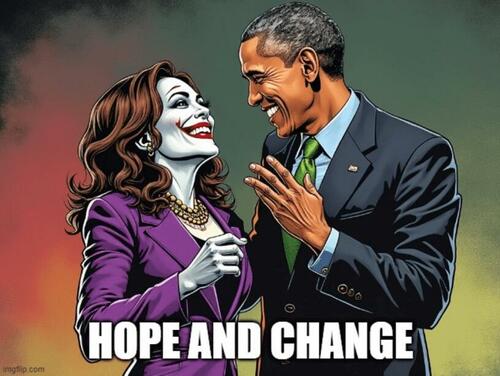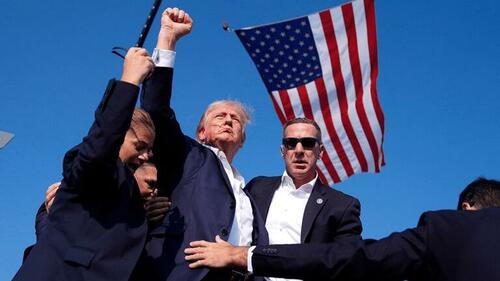
The Most Dangerous Question Of 2024 – What If Kamala Harris Isn’t An Idiot?
Authored by Tom Luongo via Gold, Goats, ‘n Guns blog,
On the eve of the Democratic National Convention, after a coup against their former standard-bearer Joe Biden, we face a very disturbing question.
What if Kamala Harris isn’t the idiot the media has made her out to be?
Harris was clearly chosen for this role. She’s been groomed for it for nearly two decades. She isn’t the best of a list of bad choices. The Democrats drove the good choices from the party and blocked others becoming a part of it.
There were no Democratic primaries, folks.
She was placed as Biden’s Vice-President to have the inside track on this gig when they decided Joe finally had to be dragged from the stage.
The coup was penciled in on the Gantt Chart at Evil Corp. Central for the weekend of July 13th.
In 2020, Harris voters roundly rejected her for President, getting zero delegates before being roasted by Tulsi Gabbard.
She dropped out despite being the darling of the media and the donor class. Going into those primaries, she was the establishment’s pick.
Once she failed they moved to Plan B: rig the game for Biden.
They said, “We’ll install a mushroom so corrupt we can make him do whatever we want Joe just wants his money and his ice cream.”
So you force Harris onto Joe. Or the other way around… never mind she’s too old for him.
Meanwhile Harris waited. She let Joe take the heat. She said little, did less and then is installed, tabula rasa, into a campaign just days after a failed assassination attempt on Donald Trump to steal even that thunder.
We were never allowed to discuss her culpability, along with the cabinet, as to how Biden could have been running the country for the past three years without them invoking the 25th amendment out of pity for the man if nothing else.
Oh, I’m sorry, I forgot Democrats don’t have emotions other than hate and envy.
She was installed as the candidate to front-run an insurgency at this week’s convention by Hillary Clinton and her merry band of Neocons. Don’t expect them to take this sitting down, there are likely to be some sparks this week in Chicago, even if they don’t turn into a bonfire.
So, that leads me to ask my question, not because I think Harris is some latent IQ160 or anything. I asked my question because this is a woman who faced zero real voters and is one vote-rigging operation away from the presidency.
So, maybe she’s a genius when measuring her political intelligence.
What if we’ve all been led down the primrose path of stooping to Trump’s level coming up with cute memes about her vast collection of knee pads or her inappropriate laughter at tragedy?
What if that is exactly the means to lull us all into thinking there’s no way anyone will vote for this woman?
And if this was any normal (a nebulous term these days at best) election, I would agree with you. But, for 90% of the fifty elections the US is going to hold for its president, who you vote for doesn’t matter.
This is, as always, a five state race.
All that matters is printing/counting the right number of votes in those five states and the rest is just a Benny Hill skit.
Harris chose uber-commie and Minnesota Gov. Tim Walz as her running mate to what, exactly? Shore up the only state that voted for Walter Mondale in 1984? Really?
No, it was to do a few things:
-
Signal that they didn’t need Pennsylvania Governor Josh Shapiro to win there.
-
Continue Obama’s antipathy towards Israel. They don’t need “The Jews” anymore.
-
Put the Quarter-Black HR Nanny in charge of the cucked White Guy.
After that, all you have to do is use AI and special effects to make fake crowds supporting fake polls and faker ads to sell everyone on the idea that this woman is what Americans want to rule them over this…
The sad part is that too many people still think this is all just part of the game. But it isn’t. It’s nothing more than the same playbook run in 2020 to create just enough plausible deniability that Harris can win this election before they steal it and dare us to do one damn thing about it.
Or did you miss how upset the French and British are at their recent outcomes?
So, Kamala cackles her way through scripted interviews. She and Walz dance around bringing “joy!” to the world. But when you actually get her talking about policy, about what she believes in, the cackling stops, the fangs come out, it’s just communism all the way down.
I was asked by Sputnik News to comment on her announced economic plan. In short, it’s the same warmed-over ‘Eat the Rich,’ politics of envy the Democrats have used for decades to set the table for a class war where the soon-to-be permanent underclass is used to finish off destroying the middle class so that they both can live in squalor and be thankful for whatever thin gruel is left over.
Those that don’t like it can go die in a meat grinder overseas somewhere else. Hey, at least it’s ‘3 hots and a cot’ right? Or is her ascension to the throne the moment when everyone gets just uncomfortable enough for the wolf to come out in a few million of us?
No, I don’t think Harris is at all stupid. And I think we’d all do well to put away the memes and get serious about making sure that we make this a November 5th to her not to remember.
Sputnik’s Questions and my full answers:
1) Harris presented something that she called an “opportunity economy”. How different do you expect this to be from “Bidenomics”?
Not much, to be honest. Democrats are looking to rebrand the same agenda they had during both Obama’s two terms and “Biden’s” one term. It’s all an extension of the original plan, which is to nationalize all the important sectors of the economy – housing, health care, energy, transportation – that the Federal Government didn’t already control, e.g. communication and defense.
This strategy is simply to break the private economy — dislocate trillions of investment capital, displace millions of workers, disrupt supply chains – and then create new “opportunities” for those most harmed by these policies, the lowest strata of wage earners young people, by giving them handouts. This is classic ‘divide and rule’ politics engaged in by the oligarch class to set the lower class, in their terminology the ‘proletariat,’ against the middle class, the “bourgeoisie.’
Nothing new here. Typical “Break your legs and hand you a crutch” politics.
2) How are the measures that Harris’ economic plan includes going to be paid for?
Debt at first and the hoped for transition to Modern Monetary Theory (MMT) after the debt passes the point of sustainability, where they just print money and tax your earnings at whatever rate they need to in order to maintain power, via programmable Central Bank Digital Currency (CBDC).
3) Harris promised to push forward a federal government law against price gouging as a solution to Americans’ frustration with the high cost of living. What effect would a law like this have on prices? How would a small business react to such a law?
The Democrats have been prepping this talking point for more than a year by sending out Elizabeth Warren to complain about corporations gouging us on food prices. But if you look at retailer, especially supermarket, corporate profits you’ll see their costs rising with our costs. The average bottom line margin for a supermarket chain is around 2%. If Harris and Warren think this is “Price Gouging” then they have no idea what the term means.
Real costs of production will rise. Prices will rise. The government will then use a flat fining structure to punish the bad guys.
Because of this small businesses will go under. Larger firms can always absorb the cost of new regulations better than smaller businesses. They are the primary target because they are the engine of economic growth. Harris is nothing new, just another in a long line of doctrinaire communists promoted via anti-democratic processes to serve an overclass desperate to hold onto power as their old system of wealth extraction reaches its terminal stage.
4) How do you assess the possibility that a federal law against price gouging might backfire and trigger shortages?
All price floors and price ceilings lead to shortages, never surpluses. This is literally first semester macro-economics. Harris and her handlers know this. In fact, they are counting on creating shortages. It’s part of the strategy in the end to destroy the country they lead.
This is not stupidity or incompetence. It is policy.
5) Harris promised to address housing affordability by issuing $25K support for first-time house byers. How would you expect such a measure to affect the housing market?
It can’t stop the deflation of housing prices, it will only further dislocate the market by keeping prices up and suckering people who can’t afford a home into thinking they can. What needs to happen is sincere price corrections which reallocate scarce capital back to generating jobs that create wealth rather than subsidizing the things you buy once you have wealth.
Starter homes now cost $180-200 per square foot to build in the US. At those prices, there are no new affordable homes. The tiny home industry in the US is booming. People are trying to right size their debt with their income. And are now coping with the insanity by telling themselves they can raise a family in 500 sq.ft. They can’t.
So, again, what’s the goal? It’s not to put people in new homes. It’s to put people in smaller homes and/or choose to live in a rented space whose cost is subsidized by the government in the medium-term to nudge them towards the preferred outcome… living in cities with no food security, no real security, and constant/total surveillance.
6) How realistic do you find Harris’ promise to build 3 million new houses?
We can build any number of houses. The US has more than enough productive capacity to build 3 million houses. That’s not the right question. The right question is should we build any new houses, and for what price?
It’s a talking point. A pathetic attempt to buy young voters who are increasingly looking at them and thinking they are crazy people.
7) How successful do you expect Harris to be in distancing herself from the criticisms and negative effects that the Biden/Harris administration’s policies had on the US economy in recent years? How would you describe her target audience and why would this tactic work for it?
She won’t be. You can’t run as the “reform candidate” when you are the incumbent. And nothing she has proposed is functionally any different than what was done previously while she was in office. Her target audience for this is the wholly unsophisticated young voter who is entering a broken workforce and economic landscape today and seeing nothing but a lack of real opportunities. They are hoping for a new round of “Obama Youth” to marshal into an effective fighting force for “Hope and Change.”
What they are doing is purposefully increasing the possibility of full-blown civil war.
8) How should we expect Harris’ economic plan to increase the US national debt?
Exponentially. Again, that is the goal. They will use ruinous fiscal policy to run out the clock on Jerome Powell and the Federal Reserve who are telling them that if they want their Communist revolution they will pay for it at 5.5% or higher. All of these ‘subsidy’ programs –food, housing, etc.—are meant to extend the current pricing regime until after the end of Powell’s term in 2026 and then close the loop, bringing the Fed back into the fold.
* * *
Join my Patreon if you hate Communism
Loading…
Originally Posted at; https://www.zerohedge.com//
Stay Updated with news.freeptomaineradio.com’s Daily Newsletter
Stay informed! Subscribe to our daily newsletter to receive updates on our latest blog posts directly in your inbox. Don’t let important information get buried by big tech.
Current subscribers:










